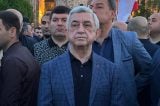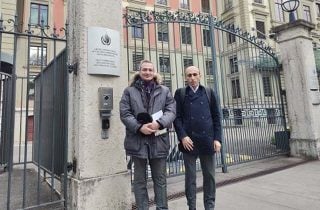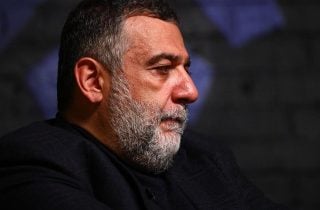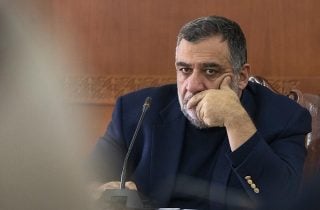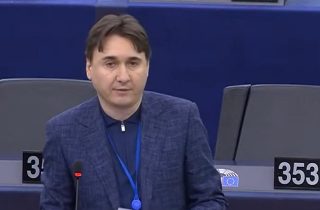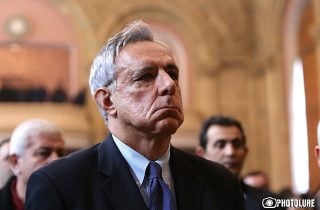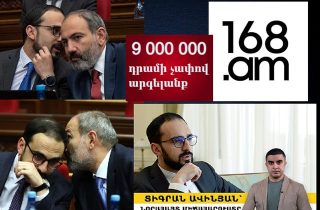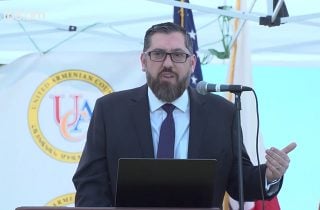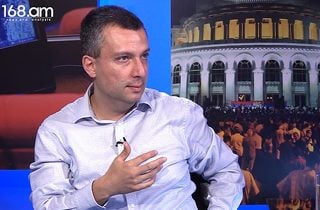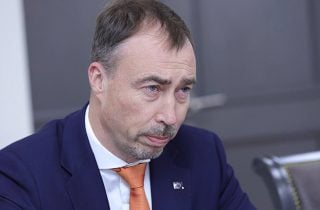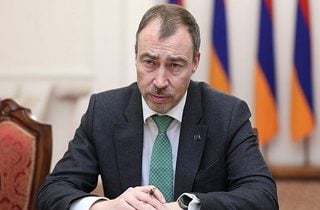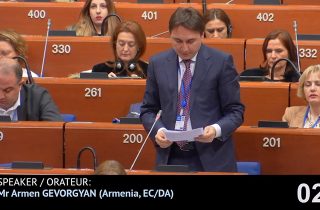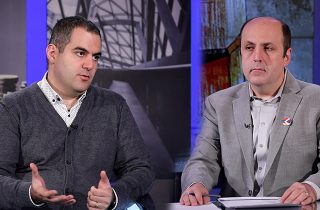Change the War Format: David Shahnazaryan
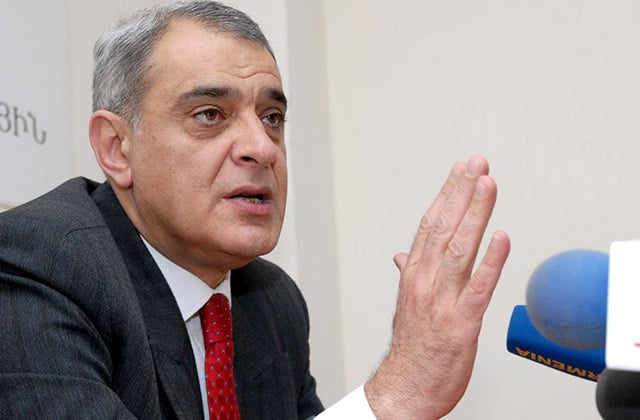
Interview with David Shahnazaryan, senior analyst at Regional Studies Center (RSC), former Ambassador Extraordinary and Plenipotentiary (1992-1995), former Head of RA National Security Service (1994-1995), is introduced below in a short version.
Mr. Shahnazaryan, April outbreak was followed by a range of active and remarkable developments: interview of Serzh Sargsyan, RA president, to Bloomberg was published on April 25, on the same day, Harlem Désir, Secretary of State for European Affairs, visited Armenia, and on that very day upon the initiative of the USA, telephone conversation between John Kerry, U.S. Secretary of State, and RA president was recorded, a few days later, Kerry-Lavrov telephone conversation was again initiated by the USA. In your opinion, what’s going on around negotiations? And what’s your assessment to current positions of the Armenian side?
I’d like to single out Serzh Sargsyan’s conceptual interview to Bloomberg. Obviously, the second Artsakh war launched in April is the direct result of NKR participation negotiation format. Namely, as a result of Karabakh’s isolation from NKR negotiation process for 16 years, we gained war, as this format is exclusively in line with interests of Azerbaijan and its ally Russia. Pay attention what assessments gained Mark Toner’s, State Department representative, reflection in the evening of April 4 by the pro-Kremlin Russian experts on NK conflict settlement process, in which he highlighted Nagorno-Karabakh right to self-determination.
Thus, disposition of the Republic of Armenia is grounded, that negotiations without NKR, return to war format won’t be recorded. This format not only failed to provide touchable result, but also served as a ground for Azerbaijan, to misrepresent the right to self-determination to the issue of territories. At least now those diverting NK from negotiations, after so many years, do they realize what considerable losses they caused to the Armenian side, and that they laid ground for Artsakh second war—I’m not sure.
Initiatives by OSCE Minsk Group Co-chair (USA) directed to stabilization of ceasefire on the Line of Contact, was denied both by Russia and Azerbaijan, as military component of Russia-Azerbaijan program—April blitzkrieg—was failed, Lavrov was obliged to speak not only of the 1994 ceasefire agreement, but also of the trilateral accord on ceasefire strengthening, reached in 1995. By the way, I repeatedly insisted throughout recent years, that NKR and Armenia should implement the accord of 1995, and Azerbaijan doesn’t accept this. It’s necessary to make use of errors by Azerbaijan, Russia’s unjustified hopes and restore NK participation in negotiations as a full party to the conflict settlement, again give life to the 1994 OSCE Budapest Summit formula, 1994 OSCE Prague document, 1994 and 1995 agreements, which Azerbaijan, together with Russia, intends to consign to oblivion.
Mediator countries aren’t able to provide security, moreover, one of the Co-chairs directly cooperates with Azerbaijan, meanwhile under present-day geo-political conditions security of Karabakh may provide exclusively recognition of NKR independence by the international community and, first and foremost, by Azerbaijan. And only after it Azerbaijan may negotiate with Nagorno-Karabakh around issues interesting to it.
Serzh Sargsyan, both during the meeting of Sergey Lavrov, RF MFA, in Yerevan, and in an interview to Bloomberg stated about inadmissibility of negotiations at that stage, then three conditions have been introduced, in case of provision of which only Armenia will participate in negotiations. Are these sufficient for this stage?
Essentially, I previously touched upon those conditions. Currently, negotiations are underway on negotiations. We should clearly understand that presently it’s not the conflict, which was on April 1; after April 2 this was a totally different conflict, which dictates Armenia completely new activities, systemic changes in all the fields—diplomacy, domestic and foreign policy, geo-political orientation. Currently, for everyone, including for various representatives of the authorities it’s obvious, that corruption is a big threat for Armenia and NKR, it also refers corruption in the military field, as situation unleashed in April uncovered all the shortcomings existent in the military field. However, it’s worth understanding, that any state in the world doesn’t provide security with army only.
First and foremost, security is foreign policy, and as I’ve already mentioned, geo-political orientation. They even try to reprimand, that negotiation, or, more precisely, meetings have been suspended, yes, suspended, and due to this very “war format.”
This is the reason, that the three Co-chairs don’t even assess who initiated this attack. Allegations, that observation of this issue is within their liabilities, are not so grounded. Moreover, pursuant the four resolutions of UN Security Council, NK is responsible for the territories, which form a part of Karabakh security zone, and Armenia doesn’t have any liabilities in this regard.
From claims for resolution directed to Azerbaijan and Nagorno-Karabakh, Aliyev remembers only one of them, and not completely. In four resolutions of UN Security Council there is only one point referring to Armenia, that the latter should make use of its impact on NK authorities. Finally, we should return to the resolution of the 1990s, which completely justified itself, NKR is the decision-maker, and Armenia initially agrees on all Azerbaijan-NKR agreements within OSCE MG format.
You mentioned visit of the Secretary of State for European Affairs to Yerevan. In this regard, I’d like to state that, calls from Paris and Washington diplomatically stress the necessity of NK participation, meanwhile other messages come from Moscow. Continuing by this format means going and discussing the plan by Lavrov, which has already been rejected by RA authorities.
To resume negotiations by NK participation, OSCE MG Co-chairs should call on the three parties to officially reconfirm readiness of implementation of all their liabilities, enshrined in agreements of 1994 on ceasefire and of 1995 of ceasefire strengthening. Firstly, this should be implemented, and it’d be productive, if this call is implemented on the co-chair level. This is exactly what Lavrov has touched upon in Yerevan, and official Yerevan can hint this to the Co-chairs.
Out of security precautions, you touched upon the necessity of NKR recognition by the international community and, firstly, by Azerbaijan. These days calls are again active by Armenia. Is there such a need?
If we strive to recognition not only by Armenia, but internationally as well, yet years ago I stated, that there is a mechanism, it’s the way of Kosovo. States like Russia and Turkey also had taken the way of unilateral recognition, and first recognized South Ossetia and Abkhazia, then South Cyprus, result in both cases is nothing. Let’s try not to make issues linked to NK security a domestic policy component. Unilateral recognition not only gives any result, but will lead to rather damaging and irreversible processes and implications, and simply, it would be a great gift for Azerbaijan.
Our organizations abroad have much work to do. I have repeatedly stated that Armenian lobbyist organizations in the USA should form groups of congressmen: one group should work for international recognition of NKR, and the other on unfreezing of 907 resolution.
It may seem unrealistic, but in 1992 it seemed unrealistic as well, that NK will become a full member of negotiations and settlement process. This purpose should be set and reached. We should realize that we’re dealing with Russia, which is hidden behind Azerbaijan, and this is becoming more and more apparent. And if Russia doesn’t officially state that it suspends equipping Baku, here rises not only the issue of productivity of Russia’s being a mediator, but also appropriateness of Armenia’s membership to CSTO. As for Eurasian Economic Union, currently it’s necessary to launch the process of Armenia’s withdrawal from that structure.
It also turns out, that as of April 2016 the Armenian side obtained neither armaments nor any military production by the USD 200 million loan agreement, and supplies are being postponed, for which, supposedly, Seyran Ohanyan left for Moscow. What do you condition this by?
Russia has deliberately postponed loan allocation, so that Russia-Azerbaijan military-political purposes were more simply implemented. Moreover, 200 millions can’t be compared to the volumes of Russia-Azerbaijan armaments deals. Currently supply of those armaments to Armenia has been launched, but, at the same time, Russia continues armaments supply to Azerbaijan, in particular, these days Baku gets from Moscow Vena self-propelled artillery (120mm) and BTR-82A armored vehicles, improved by contemporary electronic systems.
By Araks Martirosyan






